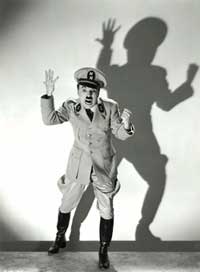It was not for nothing that Bertolt Brecht was awarded the Nobel Prize for literature and is referred to as the father of modern theatre. The Resistible Rise demonstrates his skill. Written as a humorous satire of Hitler’s rise to power, it tells the parallel story of Arturo Ui, a Chicago gangster who seeks to control the city through a protection racket focusing on cauliflower wholesalers. Ui and his henchmen, Givola, Roma and Giri, manipulate those around them through blackmail and violence, taking advantage of others' moral and psychological weaknesses. Ui recognises that if you are to be a successful gangster you need the backing of those high up. To this end he blackmails the once whiter-than-white mayor, Dogsborough, who Ui finds out has foolishly accepted shares in a business and a home from the Cauliflower trust in return for a loan (Hitler blackmailed Hindenburg into making him chancellor, possibly using the info connected to Hindenburg's acceptance of the Neudeck estate). The parallels in the stories are made clearer through the use of a large screen at the beginning of the play which presents the main Nazi protagonists and events, and through the use of loudhailer announcements. These announcements punctuate the end of scenes, telling us what the parallel event in Germany was. They are useful for historical reference, although they could possibly have been better scripted as radio announcements or omitted altogether. As they stand, on top of the initial visual presentation, they emphasise the rise of Nazism at the expense of the audience’s engagement with the Ui story. Ironically they remove the potential effect of the swastikas and Nazi salutes in the final scene.
However, other devices work well, such as the use of puppets for minor characters. In addition, once the actors warmed up, a lot of the acting was strong, particularly that of Adam Potterton as Giri and Nick Rees as Givola. On the whole this is a thought-provoking and funny play which deserves a larger audience than it received on opening night.
However, other devices work well, such as the use of puppets for minor characters. In addition, once the actors warmed up, a lot of the acting was strong, particularly that of Adam Potterton as Giri and Nick Rees as Givola. On the whole this is a thought-provoking and funny play which deserves a larger audience than it received on opening night.




